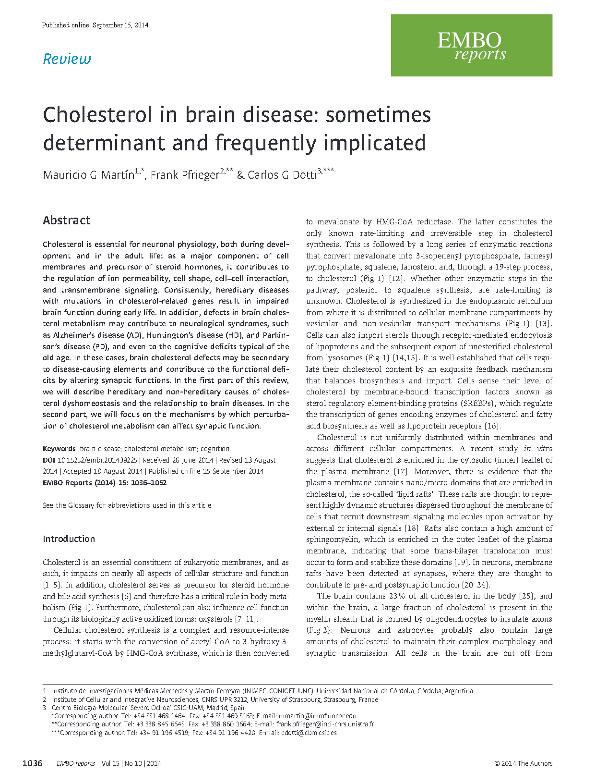Artículo
Cholesterol in brain disease: sometimesdeterminant and frequently implicated
Fecha de publicación:
09/2014
Editorial:
Nature Publishing Group
Revista:
Embo Reports
ISSN:
1469-221X
Idioma:
Inglés
Tipo de recurso:
Artículo publicado
Clasificación temática:
Resumen
Cholesterol is essential for neuronal physiology, both during development and in the adult life: as a major component of cell membranes and precursor of steroid hormones, it contributes to the regulation of ion permeability, cell shape, cell–cell interaction, and transmembrane signaling. Consistently, hereditary diseases with mutations in cholesterol‐related genes result in impaired brain function during early life. In addition, defects in brain cholesterol metabolism may contribute to neurological syndromes, such as Alzheimer's disease (AD), Huntington's disease (HD), and Parkinson's disease (PD), and even to the cognitive deficits typical of the old age. In these cases, brain cholesterol defects may be secondary to disease‐causing elements and contribute to the functional deficits by altering synaptic functions. In the first part of this review, we will describe hereditary and non‐hereditary causes of cholesterol dyshomeostasis and the relationship to brain diseases. In the second part, we will focus on the mechanisms by which perturbation of cholesterol metabolism can affect synaptic function.
Palabras clave:
Brain Disease
,
Cholesterol Metabolism
,
Cognition
Archivos asociados
Licencia
Identificadores
Colecciones
Articulos(INIMEC - CONICET)
Articulos de INSTITUTO DE INV. MEDICAS MERCEDES Y MARTIN FERREYRA
Articulos de INSTITUTO DE INV. MEDICAS MERCEDES Y MARTIN FERREYRA
Citación
Martín, Mauricio Gerardo; Pfrieger, Frank; Dotti, Carlos G.; Cholesterol in brain disease: sometimesdeterminant and frequently implicated; Nature Publishing Group; Embo Reports; 15; 10; 9-2014; 1036-1052
Compartir
Altmétricas




